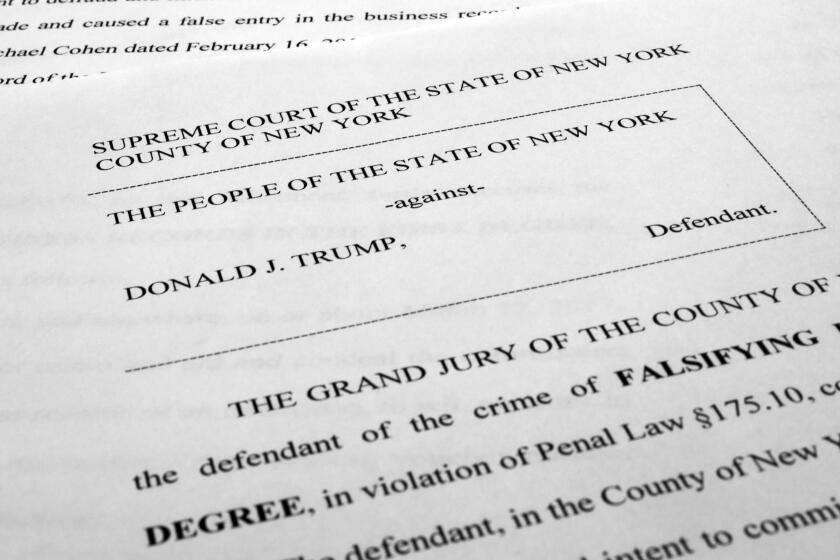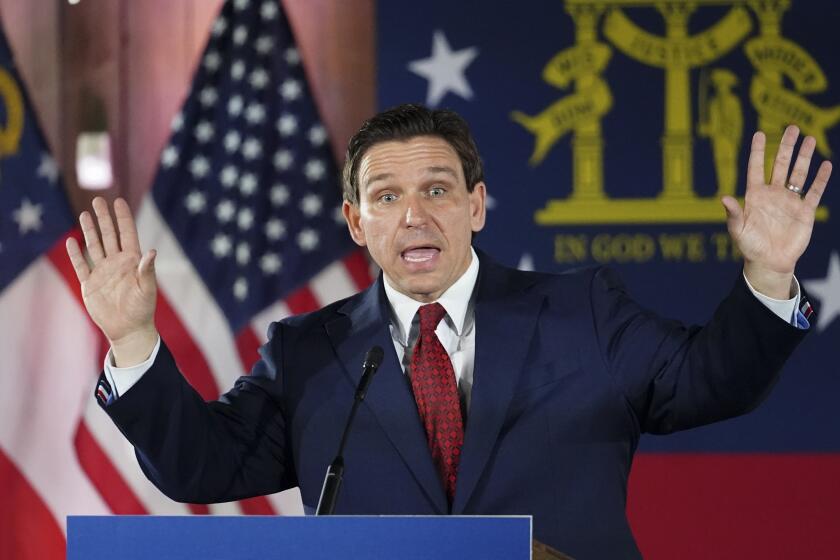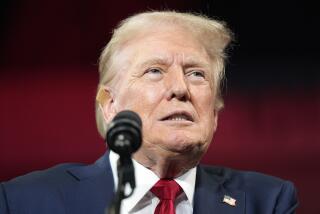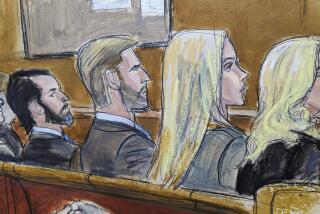Column: Don’t underestimate the strengths of Alvin Bragg’s case against Donald Trump
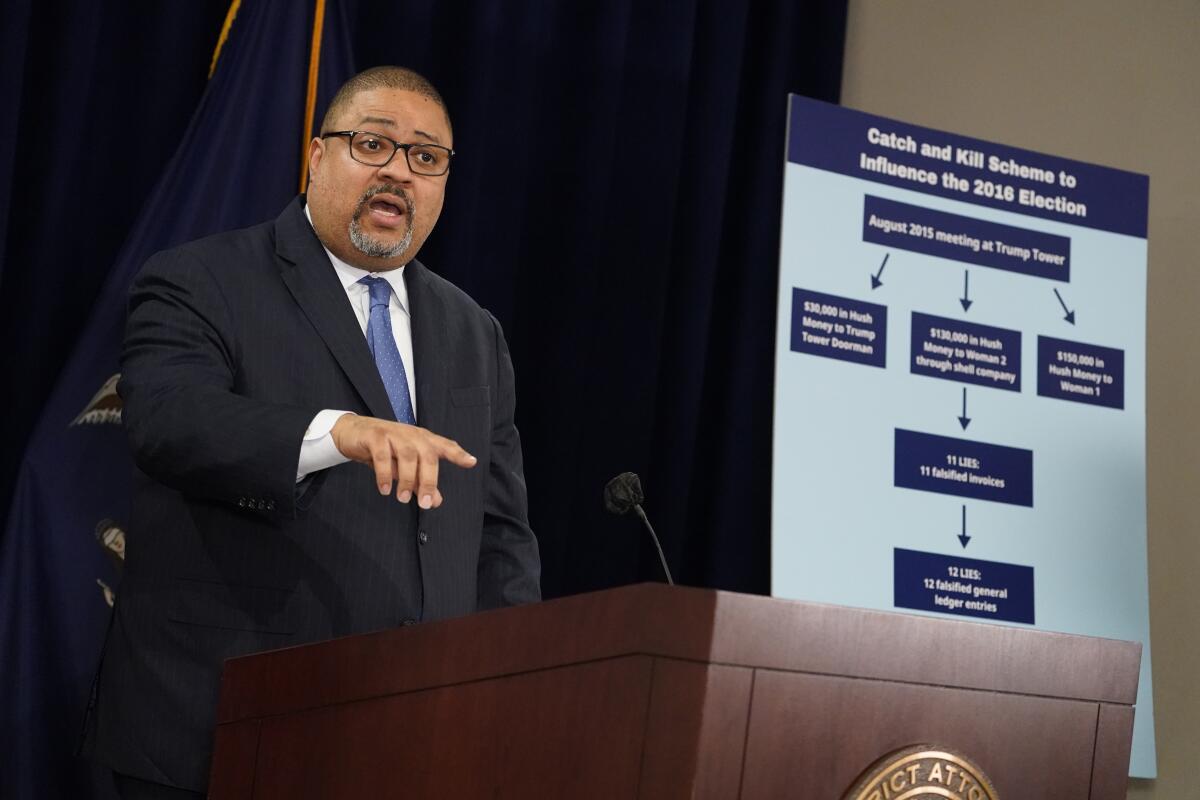
- Share via
Manhattan Dist. Atty. Alvin Bragg’s indictment of former President Trump takes an open-ended approach to the charges that some critics of the unprecedented prosecution see as a weakness. What the detractors have overlooked are the substantial and unanticipated legal and factual strengths in the case Bragg outlined.
A key question in advance of Tuesday’s unsealing of the indictment concerned how Bragg would augment the easily proven misdemeanor charges of falsifying business records. Under New York law, those offenses become felonies only if they’re in furtherance of another crime. Many theories were circulating as to what second crime Bragg would allege, and most of the possibilities had noteworthy shortcomings.
Bragg’s answer was essentially “I’ll tell you later.” He took advantage of the wording of the state law, which requires only that the misdemeanor be done in service of “a crime,” to buy himself maximum time and flexibility.
Bragg may have to pick his crime down the line, perhaps in answer to an expected defense motion for a “bill of particulars” — that is, a fleshing out of the Delphic indictment to enable Trump’s team to prepare an appropriate defense.
On the other hand, the prosecutor may not have to specify a second crime. The jury instructions on falsification of business records say it’s a felony if the defendant acted “with intent to defraud that included an intent to commit another crime or to aid or conceal the commission thereof.” It’s therefore not clear that they require the jury even to agree on what the augmenting crime is.
Former President Trump appeared in New York and his indictment was unsealed. The charges involve his payment of hush money to Stormy Daniels.
But Bragg this week also added a potent possible second crime beyond what many observers expected. It emerges from the fact that in making his lawyer Michael Cohen “whole” for the hush money he paid to Stormy Daniels, Trump included enough to compensate Cohen for the taxes he would have to pay on the “income” — that is, on the phony legal retainer that camouflaged the hush money.
It’s not clear whether Cohen in fact declared and paid taxes on the reimbursement or whether the Trump Organization declared it as a business expense. The Bragg team’s insight is that it doesn’t matter: The language that elevates business record falsification to a felony only requires “an intent to commit another crime or to aid or conceal the commission thereof.”
That purposely encompasses what lawyers call “inchoate” crimes. The law would plainly be satisfied by the inclusion of money intended to commit or conceal another crime — namely, a false tax filing — whether or not that crime occurred.
Importantly, this theory could be a way around the legal questions inherent in alleging that the second crime was a state or federal campaign finance violation.
The Florida governor threatened to refuse to extradite former President Trump to New York, showing contempt for the Constitution and the rule of law.
Alleging a campaign finance violation would also raise a factual dispute over whether the hush money was really paid to buoy Trump’s electoral prospects. Team Trump continues to suggest that the actual purpose of the payout was “to prevent something coming out [that was] false but embarrassing to himself, his family, his young son,” as Trump lawyer Joe Tacopina put it.
That is a far-fetched theory to be sure: The idea that Trump may not be a loyal spouse wouldn’t come as a shock to most people, let alone those who know him best. But in a setting in which the prosecution must prove its case beyond a reasonable doubt, the claim that he was trying to protect his family’s feelings can’t be totally disregarded.
Here is where it’s important that Bragg alleged an entire course of conduct — not just the Daniels payout but also a broader “scheme to boost [Trump’s] election prospects” by squelching other potentially damaging stories. Bragg pointedly emphasized that much in his spare public statements this week, suggesting that David Pecker, the former chief executive of the National Enquirer’s parent company, will be a critical witness.
Bragg’s “statement of facts” supplied a nugget of new information that blows the Trump team’s alternative explanation of the payment out of the water. It notes Trump told Cohen that “if they could delay the payment [to Daniels] until after the election, they could avoid paying altogether, because at that point it would not matter if the story became public.”
If the jury credits that statement, it will demolish the argument that Trump only sought to conceal the tawdry facts from Melania. In fact, it proves that Trump was fine with broadcasting the affair to his family and the rest of the world once his election was secured.
So even as Bragg hedged his bets with a skeletal indictment, his statement of facts and public comments reveal a clear path to a felony conviction: showing that Trump’s falsification of business records was meant to aid and conceal a tax offense (whether or not it occurred) and to prevent a revelation that would damage his campaign on the eve of the election.
Harry Litman is the host of the “Talking Feds” podcast. @harrylitman
More to Read
A cure for the common opinion
Get thought-provoking perspectives with our weekly newsletter.
You may occasionally receive promotional content from the Los Angeles Times.
